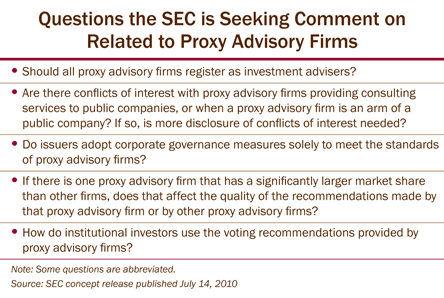|
AGENDA |
|
|
The
week's news from other boardrooms |
|
|
SEC Examines Role of
Proxy Advisors in Concept Release
Article
published on July 19, 2010
By
Kristin Gribben
The SEC voted unanimously last week to publish a
concept release for a 90-day public comment period on ways to improve
the proxy voting system. The release includes questions about the proxy
advisory industry and whether it has undue influence on the proxy voting
system.
The commission has promised to address proxy voting “plumbing” issues since
2009. The Shareholder Communication Coalition, which
consists of trade and lobbying groups such as the National Investor
Relations Institute (NIRI), the Business Roundtable
and the National Association of Corporate Directors, has
been advocating for proxy voting reform for several years. The last time the
commission took a detailed look at the voting system was nearly 30 years
ago.
Business groups have been vocal in their support of having the commission
address problems with the current system, especially following the passage
of shareholder activist-friendly measures both in Congress and at the SEC.
“Our recent rulemakings and proposals, while seeking to empower
shareholders, would act, in my view, to empower only the right shareholders
— institutional investors, labor unions and public pension funds — to the
detriment of retail shareholders,” Commissioner Kathleen Casey
said at the July 14 meeting. “By approving the amendments to Rule 452 we
have disenfranchised those retail shareholders,” she said, referring to the
SEC’s decision last year to ban broker votes during director elections.
The release addresses a wide variety of issues. The main questions the SEC
is asking that are likely of concern to corporate directors are whether
investors should be allowed to remain anonymous to issuers (objecting
beneficial owner, or OBO, versus non-objecting beneficial owner, or NOBO),
how to encourage more retail investor participation through mechanisms such
as client-directed voting to broker-dealers and whether there should be
greater regulation of proxy advisory firms.
The OBO/NOBO issue is of particular interest to issuers that have been hit
with proxy battles and who argue there needs to be an easier way of
communicating directly with their shareholders. The Shareholder
Communication Coalition advocates for doing away with the OBO option and
allowing issuers to directly contact their investors, while some investors
say they opt for OBO status to protect their trading strategies.
In the area of proxy advisory firms, the SEC is asking for public comment on
whether there should be more disclosure of potential conflicts of interest,
enhanced oversight over the formation of voting recommendations, and public
disclosure of their voting recommendations in SEC filings. Proxy advisory
firms “may be subject to undisclosed conflicts of interest or may fail to
conduct adequate research,” said SEC Chairman Mary Schapiro
at the meeting.
The SEC says it will consider asking proxy advisory firms for increased
disclosure regarding the extent of research involved with a particular
recommendation, requiring disclosure of proxy advisory firms’ policies and
procedures for interacting with issuers, informing issuers of
recommendations and handling appeals of recommendations, and requiring proxy
advisory firms to file their voting recommendations with the SEC as
soliciting material.
Officials at the Center on Executive Compensation say
reform of proxy advisory firms is even more important on executive
compensation-related recommendations now that say on pay will be mandatory.
“There have been legitimate questions raised around the analytical rigor
with which compensation is reviewed and reported by proxy advisory
services,” says Charlie Tharp, executive vice president for
policy, in a statement.
Other Parts of the Release
The release is divided into three general subjects. The first deals with the
accuracy, transparency and efficiency of the voting process, which includes
the over-voting and under-voting of shares, accurate vote tabulation of
shares, vote lending by institutional investors, and proxy distribution
fees. The second area deals with shareholder communication and
participation. This includes the OBO/NOBO debate, how to improve retail
investor participation through education and client-directed voting and
whether the SEC should data-tag proxy statements for corporate governance
issues such as executive compensation and director qualifications. The third
area explores the relationship between voting power and economic interest,
which primarily includes a discussion of the proxy advisory firms, along
with issues like empty voting, whereby voting rights are decoupled from
voting interests.
Following the 90-day comment period, the SEC is expected to issue a rule
proposal that would again be open for public comment before a final rule
would be passed.

|
|
|
An Information Service of
Money-Media,
a Financial Times Company |
|
|
